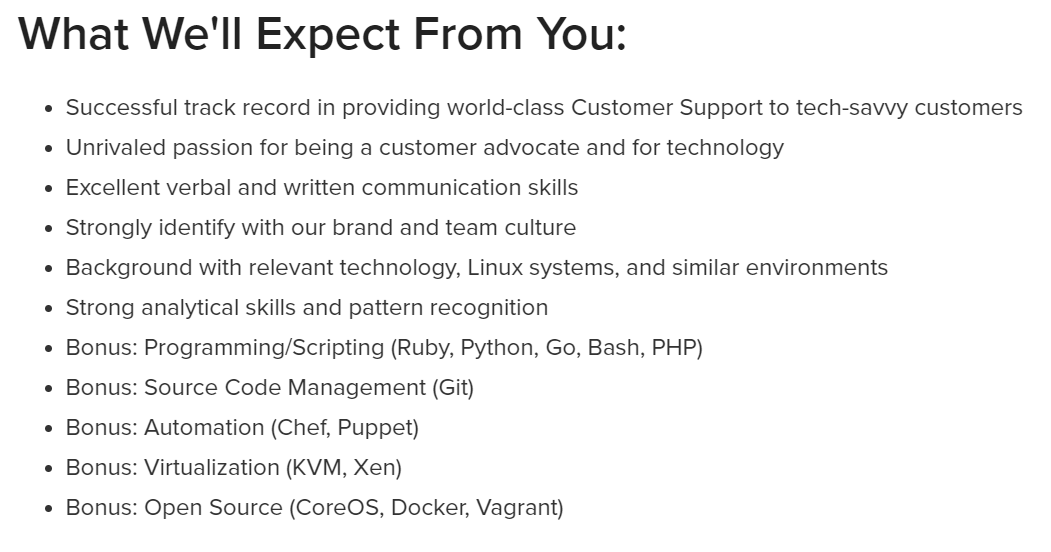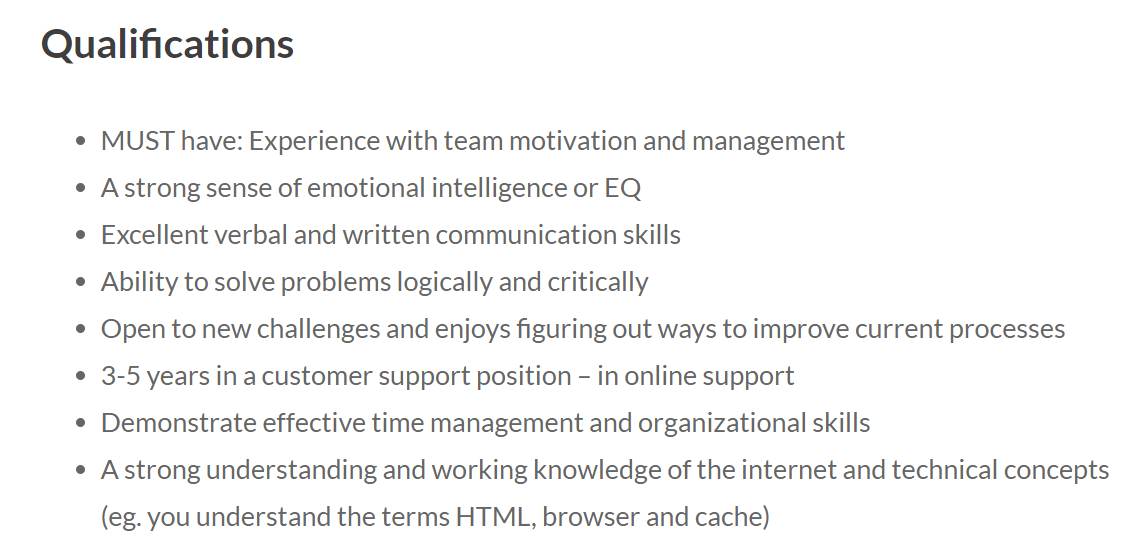Soft skills are much more than just being nice.
If you’ve put together a list of personal development goals lately, it’s probably looked a little like this:
• Complete Javascript course on Codecademy
• Work with data team on CSAT analysis trends
• Increase CSAT score to 95%
For most of us, when we think about learning new skills for our roles, we want to pick up extra hard skills. But that might not be where we should be spending our effort.
Hard skills are measurable and easily demonstrated: mathematical reasoning, typing skills, speaking a foreign language, etc. Many hard skills can be taught in schools, or come with certifications. Learning a new hard skill can be an easy goal to set for ourselves.
Soft skills are more difficult to quantify or teach. A strong work ethic, teamwork, flexibility are all examples of soft skills. Super important too, but how do you measure someone’s teamwork skills?
Because soft skills can be more difficult to quantify and certify, they can get neglected in personal development goals and reviews. Your annual review might focus more on the technology you’ve mastered and ignore improvement in patience. This imbalance makes it difficult to understand what skills are required to be successful in customer service.
In this post, we explore which skills are most important in a customer service role and how you can develop your skillset.
What skills are required to be successful in customer service?
Peggy Klaus, in her book The Hard Truth About Soft Skills explains that hard skills, like the technical ability needed to do the job are important. But “soft skills allow you to more effectively use your technical abilities and knowledge.” This is especially true for customer service jobs.
If you’re looking at customer service job postings, you might see a mixture of hard and soft skills listed in the requirements. For example, this technical support posting for DigitalOcean is looking for customer advocacy and communication skills – which are both soft skills. But because this is a more technical position, they’ve also listed hard skills such as Linux experience.
Note that a lot of the hard skills are listed as “bonus” skills to have. That’s probably because it’s fairly easy to teach someone with a Linux background how to debug Ruby or use Git. But most managers don’t want to hire someone with poor communication skills – it’s much harder to teach. As you progress in your customer service career, soft skills become more important. However, when you start thinking about the ways you could improve your soft skills, it can be difficult to know how to begin.
As you progress in your customer service career, soft skills become more important. However, when you start thinking about the ways you could improve your soft skills, it can be difficult to know how to begin.
Take a look at this position for a Customer Happiness Manager at Fracture. The emphasis is on motivation, emotional intelligence and time management. There’s only one small line for hard skills like understanding HTML. A large majority of your time in customer service is spent interacting with the public. It’s great if you can troubleshoot advanced code and type quickly, but if you can’t communicate clearly, you won’t be successful. While hard skills are valuable, customer service runs on soft skills.
A large majority of your time in customer service is spent interacting with the public. It’s great if you can troubleshoot advanced code and type quickly, but if you can’t communicate clearly, you won’t be successful. While hard skills are valuable, customer service runs on soft skills.
Here is a list of hard skills and soft skills that can help visualize the difference between them:
| Hard Skills | Soft Skills |
| Typing Speed | Patience |
| Foreign Languages | Work Ethic |
| Data Analysis | Conflict Resolution |
| Software Programming | Teamwork |
| Operating Machinery | Flexibility |
| Accounting | Empathy |
| Graphic Design | Communicating Difficult Concepts |
| Certificates or Diploma | Negotiating |
| First Aid | Managing Stress |
Highlight soft skills on your resume
Okay, so you found a great job posting that values both the hard and soft skills. How do you prove you’re empathy driven? What can you do to highlight your conflict resolution skills? It’s a lot more difficult to present soft skills than hard skill certifications.
The trick is to think about what your soft skills allowed you to accomplish. If you think you have great negotiation skills, were you able to use them to retain more customers? Maybe your change management skills helped you roll out a new process for dealing with returns. Empathy skills are huge in obtaining high customer satisfaction scores.
Don’t just say you have empathy or teamwork skills. Explain what you’ve done with them in the past. Let them know that should a situation ever need to be escalated or someone really needs a help, they can count on you to be there for them. You’d be surprised how many resumes list “people skills” as one of their strengths, but don’t explain it any further.
You could even go non-conventional and include quotes from your customer’s feedback surveys on your resume. Keep a clippings file of quotes and testimonials that show off your customer service abilities to use for resume designing.
Are soft skills trainable?
If you believe your soft skills are holding you back from that next promotion, you’re not alone. We often spend 16 years in school learning the hard skills of our trade, only to discover that the workplace values people skills over our ability to use a calculator. Never fear!
It’s just as possible to learn soft skills as it is to learn to speak French. The bad news is that just like picking up a different language, picking up soft skills like negotiating, conflict management, and teamwork takes time and effort.
If you’ve ever worked with someone who has a knack at calming down difficult customers over the phone, they haven’t picked up that skill by accident. They’ve likely spent time working with frustrated people in some capacity for many years. Maybe they’ve read a few blog posts and learned tactics along the way. But the only way to improve your soft skills is to continually use them.
During a review with my manager at Starbucks, it was brought up that I could come across too negative or unfriendly. She mentioned that I never gave compliments to the people around me. And it was true! I felt awkward saying nice things about my team members, and it was affecting my relationship with them.
My manager suggested I practice giving one compliment each day for a year, even if it felt uncomfortable. I took up the challenge. When my next annual review rolled around, I was so good at giving compliments, I’d even been complimented on it!
The more you purposefully practice using your soft skills, the faster they will improve. Have someone you trust sit in on a meeting and ask them for specific feedback on how you managed a difficult conversation. Bring up skills that you want improve on in your one on ones.
Thinking about it like learning a different language is helpful. If you’re trying to learn French, you’ll make some mistakes. It might be scary to try speaking a foreign language you don’t know well. But over time you’ll make fewer mistakes until it feels natural.
How do you practice some more obscure skills like patience or stress management? It’s important to find what works for you. The first step is realizing when you’re not exhibiting the behaviour you want to practice – and that comes from self awareness.
Meditation apps, like Headspace can be a great way to become more self aware and gain the skills needed to manage stress, even in difficult times.
What soft-skills to strive for?
Understanding how soft skills impact the metrics your business cares about can help support your case for who you want to hire, how you support your customers, and how valuable support is to the business. So we prepared a couple of often mentioned skills from experts in customer service. Here are 7 key soft skills you need to know:
1. Reliability – Trust is the keystone to all other qualities, and the leader and the team must be able to able to trust that others will reliably do what they say
2. Ambiguity – Especially in startup tech, or in fast-paced industries. Not having all the details, or having those details change frequently is common and having a team that can weather that storm will make your company more productive
3. Collaborative mindset – Support is not an island. Each team member must have a mentality that they will work with whichever team of whoever is responsible to make the best outcome for a customer.
4. Critical Thinking – Seeking total resolution for a customer typically extends past their initial ask.
5. Discipline – There are highs and lows in customer-facing positions. Discipline kicks in when motivation doesn’t.
6. Consistency – Similar to reliability, creating a quality of work that is consistent helps us to set expectations and measure against them.
7. Trust – All of the above falls away if you can’t trust your team. Hiring colleagues that have your back lets you do your job better.
Understand the value of soft skills
Soft skills have had a bit of a branding failure. If you think of “soft” skills, you probably think of a happy smiling “people-person” who is generally pleasant to be around.
But soft skills are much more than just being nice. Customer service agents deescalate bad situations, advocate for customers internally and communicate complex ideas to non-technical customers.
Master the soft skills and the technical prowess won’t matter nearly as much as you think. That’s why it’s so important that everyone in customer service understands the value of flexing their soft skills. They aren’t easily acquired, and not everyone has them. But by emphasizing the importance of soft skills we can all work better, together!








